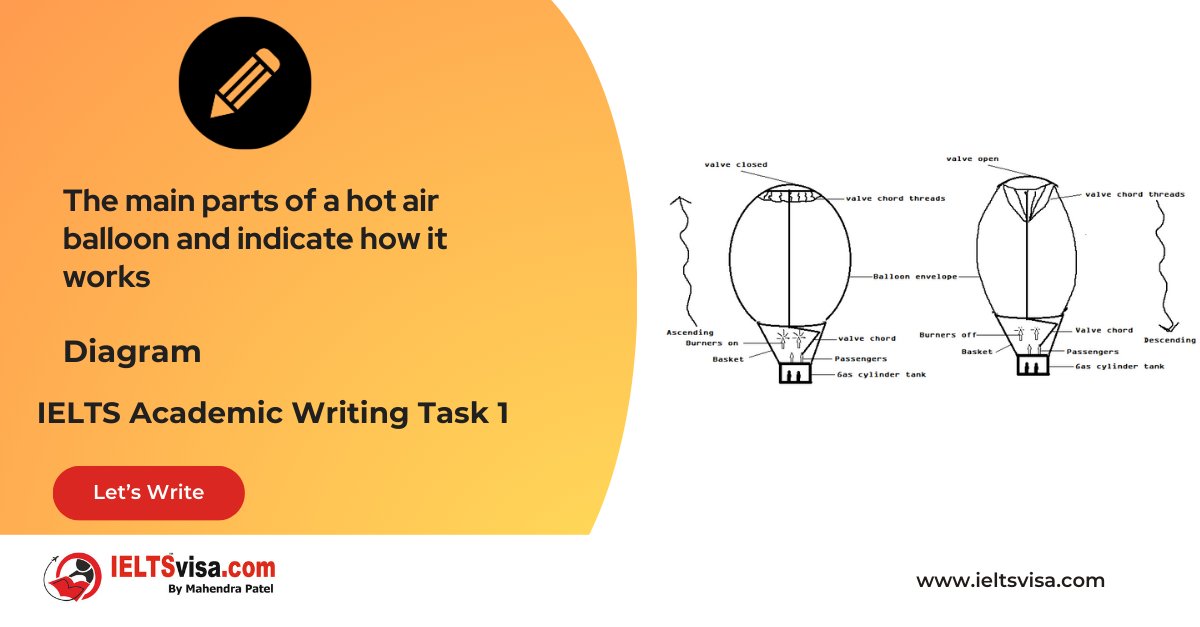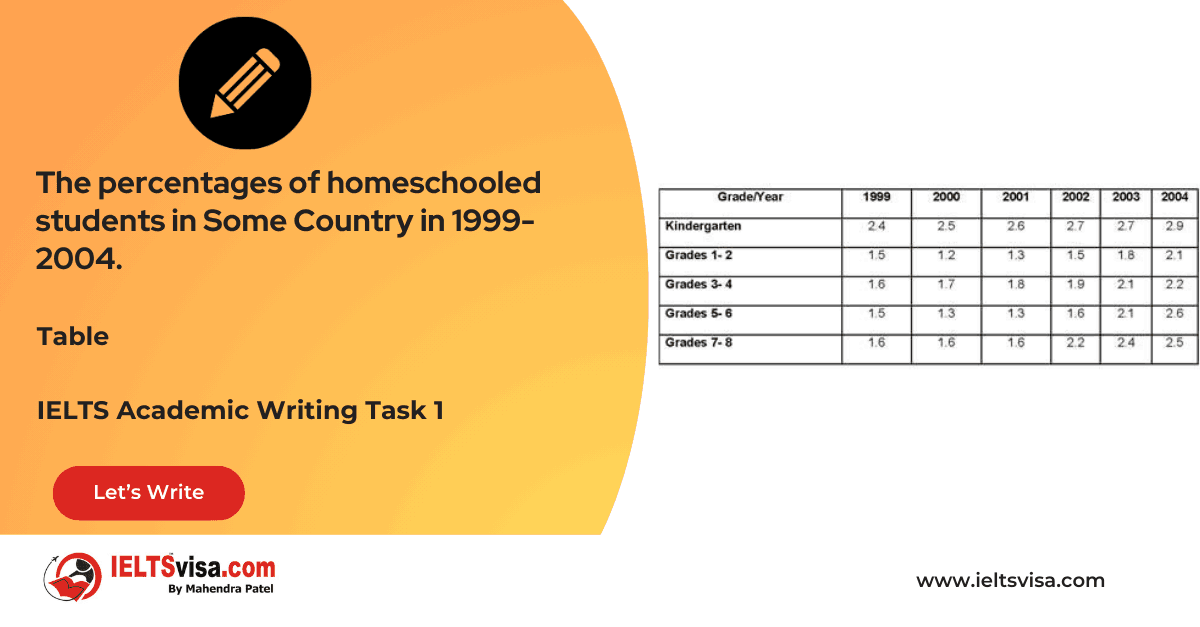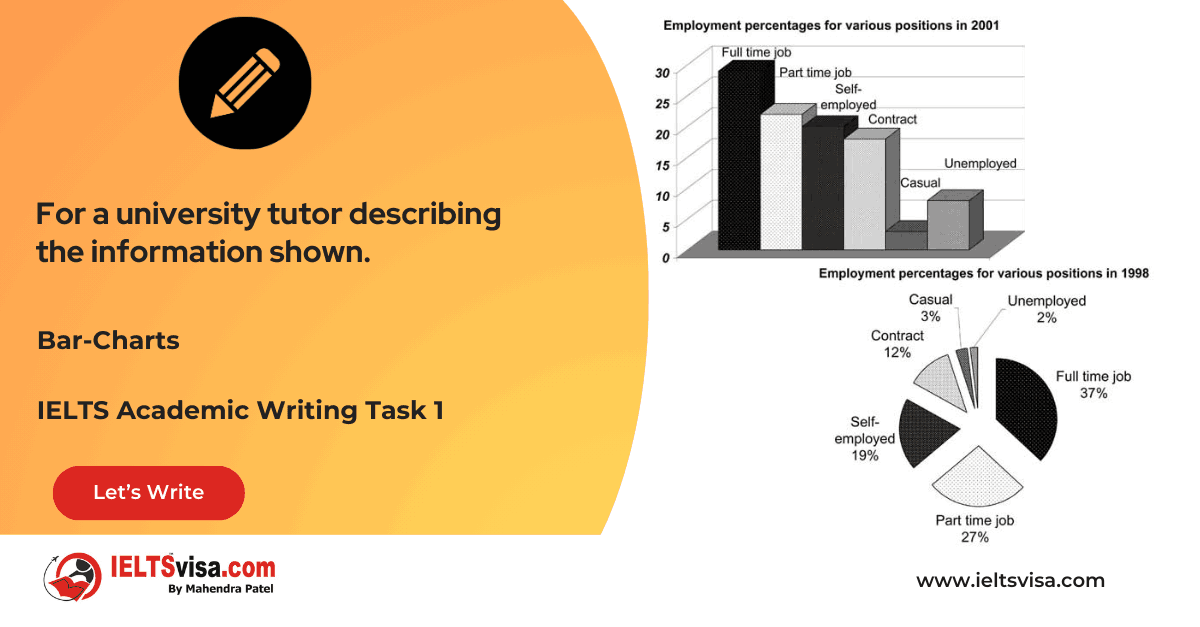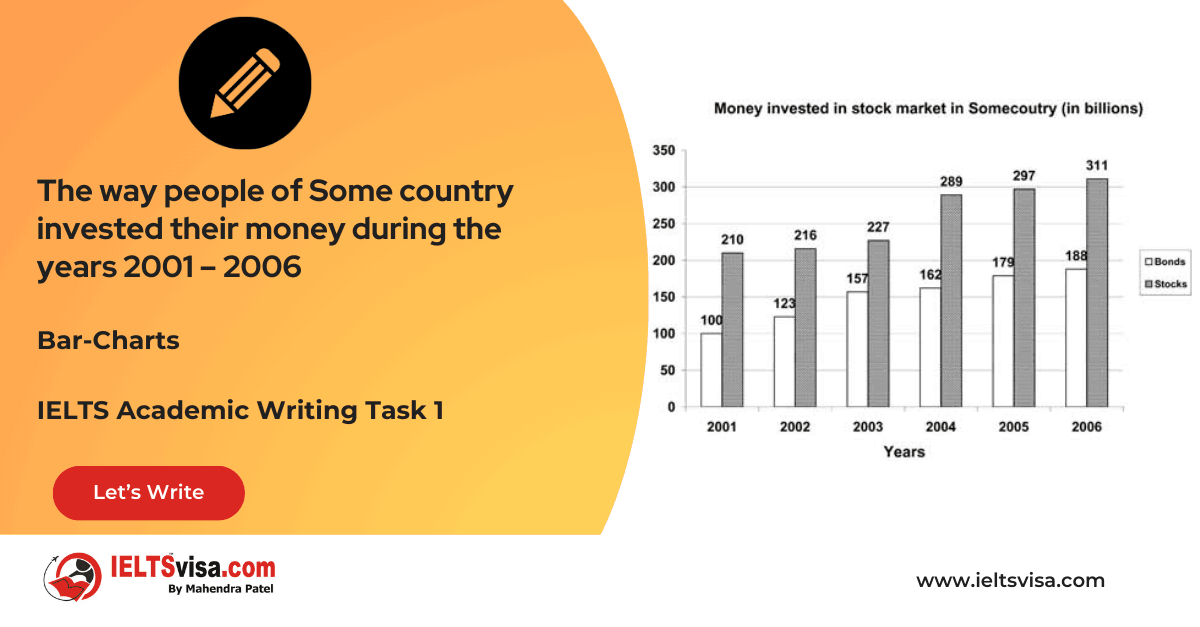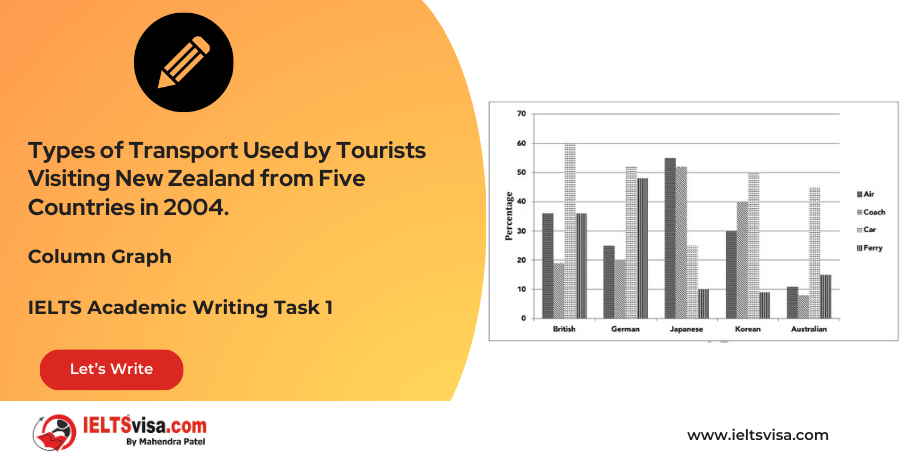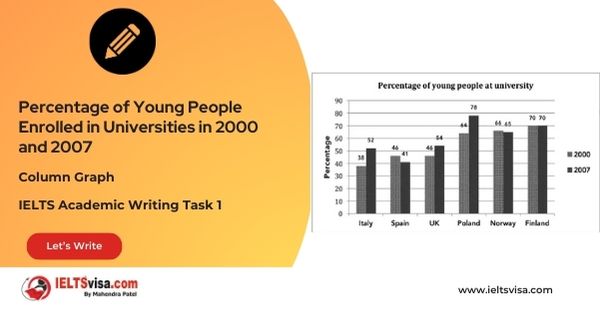Methods of Waste Disposal in Four Countries
IELTS Academic Writing Task 1 - Bar Graph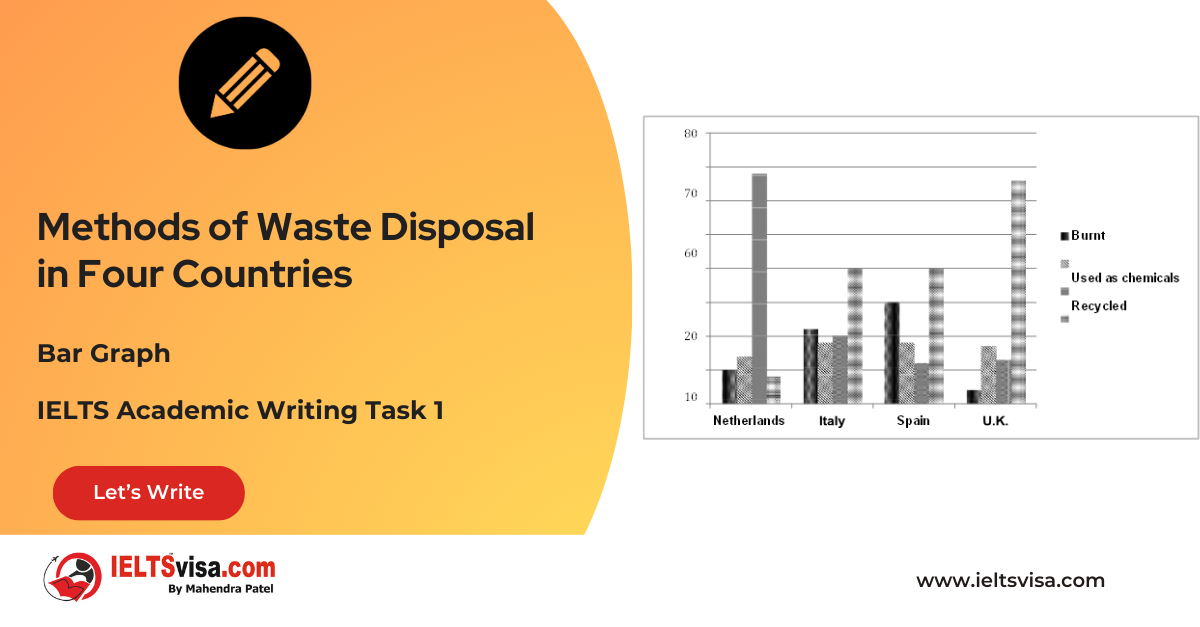
IELTS Writing Task 1 Question
The graph below shows four methods of dealing with waste in four countries.
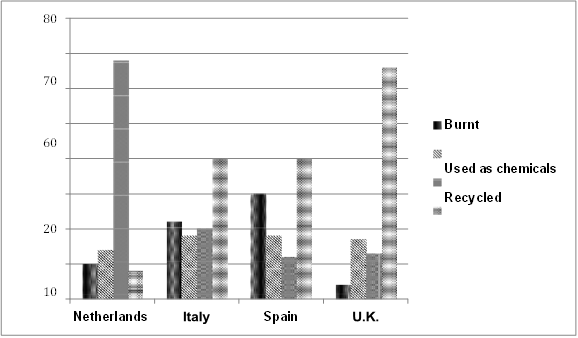
Common questions for the waste disposal graph
1. Graph Type: Column graph (bar chart).
2. Title: Methods of Waste Disposal in Four Countries
3. What are the units of measurement?: Percentage of waste disposed of by each method (landfilling, recycling, composting, incineration).
4. Who: The data compares the methods of waste disposal in four countries: the Netherlands, Italy, Spain, and the UK.
5. When: The data is not time-specific, but it likely represents current waste disposal methods used by these countries.
6. Where: The countries being compared are the Netherlands, Italy, Spain, and the UK.
7. Topic: The graph shows the distribution of waste disposal methods across four countries.
Process Showing and Trends
Comparison 1: Recycling
- The Netherlands is the leader in recycling, with about two-thirds (66%) of its waste being recycled. In comparison, the UK only recycles 13% of its waste, making recycling the least popular method there.
Comparison 2 : Landfilling
- Landfilling is the most common waste disposal method for Italy, Spain, and the UK. Italy and Spain landfill about 40% of their waste, while the UK landfills a larger percentage, around 65%. In contrast, the Netherlands uses landfilling for only 8% of its waste.
Comparison 3 : Composting and Burning
- Landfilling is the most common waste disposal method for Italy, Spain, and the UK. Italy and Spain landfill about 40% of their waste, while the UK landfills a larger percentage, around 65%. In contrast, the Netherlands uses landfilling for only 8% of its waste.
Sample Answer
The given column graph illustrates waste disposal methods used in four countries: the Netherlands, Italy, Spain, and the UK.
The Netherlands stands out for its high recycling rate, recycling two-thirds (66%) of its waste. In contrast, the UK recycles only 13% of its waste, with landfilling being the dominant method at 65%. Spain and Italy also primarily use landfilling, with both countries landfilling about 40% of their waste. Recycling is much less common in both these countries, with the Netherlands leading in this area.
When it comes to composting, the Netherlands uses 14% of its waste for composting, while the UK composts 17%. Burning, or incineration, is more widely used in Italy and Spain. Spain burns 30% of its waste, while Italy incinerates 22%, making burning the second most popular disposal method in these countries. The UK uses burning the least, at only 5%.
Overall, the Netherlands focuses on recycling, while landfilling and incineration are more prevalent in the UK, Italy, and Spain.
Top 25 Vocabularies
| Vocabulary | Meaning | Synonyms | Examples | Type |
| Dominant | Having the most influence or power | Leading, primary | “Landfilling is the dominant method of waste disposal in the UK.” | Adjective |
| Incineration | The process of burning waste to convert it to ash | Burning, combustion | “Spain incinerates 30% of its waste, making burning the second most popular method there.” | Noun |
| Prevalent | Widespread, commonly occurring | Common, widespread | “Landfilling is the most prevalent method in Spain, Italy, and the UK.” | Adjective |
| Distribution | The way something is spread or arranged | Allocation, dispersion | “The distribution of waste disposal methods varies greatly between these countries.” | Noun |
| Conversion | The process of changing something into a different form or use | Transformation, change | “About 17% of the UK’s waste is converted into compost.” | Noun |
| Method | A way of doing something, a procedure or technique | Approach, process | “Recycling is the preferred method of waste disposal in the Netherlands.” | Noun |
| Focus | The center of attention or interest | Emphasis, concentration | “The Netherlands focuses on recycling more than other methods.” | Noun/Verb |
| Waste | Unwanted or unusable material | Rubbish, garbage | “The percentage of waste recycled varies greatly between countries.” | Noun |
| Prominent | Important or well-known | Noteworthy, distinguished | “Recycling is the prominent waste disposal method in the Netherlands.” | Adjective |
| Allocate | To distribute or assign resources or duties | Assign, allot | “The countries allocate a significant percentage of waste to landfilling.” | Verb |
| Contrast | To compare two things in order to highlight differences | Comparison, differentiation | “The graph contrasts waste disposal methods across four countries.” | Noun/Verb |
| Popular | Liked or enjoyed by many people | Well-liked, favored | “Incineration is the most popular method in Italy and Spain.” | Adjective |
| Emphasize | To give special importance to something | Highlight, stress | “The Netherlands emphasizes recycling, which is the highest in the region.” | Verb |
| Proportion | A part or share of a whole | Percentage, fraction | “A large proportion of the UK’s waste is landfilled.” | Noun |
| Predominant | The most important or noticeable | Dominant, principal | “Landfilling is the predominant waste disposal method in the UK.” | Adjective |
| Measure | A standard or method used to quantify or assess something | Gauge, indicator | “The graph measures the percentage of each waste disposal method used.” | Noun/Verb |
| Shift | A change or movement from one position to another | Change, transition | “There has been a shift in waste disposal methods in recent years.” | Noun/Verb |
| Ratio | A relationship between two numbers or amounts | Proportion, correlation | “The ratio of recycling to landfilling is much higher in the Netherlands.” | Noun |
| Utilize | To make use of something | Use, employ | “The UK utilizes composting and burning more than recycling.” | Verb |
| Shift | A change in direction or tendency | Transition, adjustment | “The waste disposal shift in Spain and Italy emphasizes more burning.” | Noun |
| Widely | To a large extent, in many places | Universally, extensively | “Burning is widely used in Italy and Spain.” | Adverb |
| Subsequent | Following in time or order | Next, ensuing | “Subsequent years saw an increase in the focus on recycling.” | Adjective |
| Variation | A change or difference in condition or amount | Difference, fluctuation | “There is a great variation in the waste disposal methods of these countries.” | Noun |
| Contribute | To give or add to something to help achieve something | Add, donate | “Incineration contributes significantly to waste management in Spain.” | Verb |
| Absence | The lack or nonexistence of something | Nonexistence, lack | “The absence of proper recycling infrastructure leads to more landfilling.” | Noun |

Our Books
Master IELTS Speaking Part 1
IELTS Writing Task 1 Book
IELTS Writing Task 2 Book
Practice IELTS Other Modules
IELTS Listening
The IELTS Listening test assesses how well you can understand spoken English in various contexts. It lasts about 30 minutes and is divided into four sections with a total of 40 questions. The listening tasks become increasingly difficult as the test progresses.
IELTS Academic Reading
The IELTS Academic Reading section assesses your ability to understand and interpret a variety of texts in academic settings. It is designed to evaluate a range of reading skills, including skimming for gist, reading for main ideas, reading for detail, understanding inferences, and recognizing a writer's opinions and arguments.
IELTS Speaking
The IELTS Speaking test assesses your ability to communicate in English on everyday topics. It lasts 11-14 minutes and consists of three parts: introduction, cue card, and a discussion based on the cue card topic.
IELTS General Reading
IELTS General Reading tests your ability to understand and interpret various types of texts. Here are some key areas and types of content you can expect to encounter in the reading section, along with tips for effective preparation.
IELTS Academic Writing Task 1
In IELTS Academic Writing Task 1, you are presented with a visual representation of information, such as graphs, charts, tables, or diagrams, and you are required to summarize, compare, or explain the data in your own words.
IELTS General Writing Task 1
In IELTS General Writing Task 1, you are required to write a letter based on a given situation. The letter can be formal, semi-formal, or informal, depending on the prompt. Here’s a breakdown of the key components to include in your letter
IELTS Academic Writing Task 2
In IELTS Academic Writing Task 2, you are required to write an essay in response to a question or topic. Here’s a guide to help you understand the essential elements of this task
IELTS Exam Tips
To succeed in the IELTS exam, practice regularly, familiarize yourself with the test format, improve your vocabulary, develop time management skills, and take mock tests to build confidence.
Grammer for IELTS
Grammar is the foundation of effective communication in English. Understanding tense usage, subject-verb agreement, and sentence structure enhances clarity and coherence in writing and speaking.
Vocabulary for IELTS
Vocabulary plays a crucial role in the IELTS (International English Language Testing System) exam, especially in the Speaking and Writing sections. Here’s an overview of why vocabulary is important and how it impacts your performance
RECENT IELTS SAMPLES QUESTIONS AND ANSWERS
Task 1 – Diagram – A conference hall built in 1981 and planned for 2020
20:00 Start Pause Stop [df_adh_heading title_infix="IELTS Writing Task 1 Question" use_divider="on"...
Task 1 – Table – The percentages of homeschooled students in Some Country in 1999-2004.
20:00 Start Pause Stop [df_adh_heading title_infix="IELTS Writing Task 1 Question" use_divider="on"...
Task 1 – Table – For a university tutor describing the information shown.
20:00 Start Pause Stop [df_adh_heading title_infix="IELTS Writing Task 1 Question" use_divider="on"...
Task 1 – Bar-Charts – The way people of Some country invested their money during the years 2001 – 2006
20:00 Start Pause Stop [df_adh_heading title_infix="IELTS Writing Task 1 Question" use_divider="on"...
Task 1 – Diagram – Rainwater Harvesting and Conversion to Drinking Water in an Australian Town.
20:00 Start Pause Stop [df_adh_heading title_infix="IELTS Writing Task 1 Question" use_divider="on"...
Task 1 – Column graph – Percentage of Young People Enrolled in Universities in 2000 and 2007.
20:00 Start Pause Stop [df_adh_heading title_infix="IELTS Writing Task 1 Question" use_divider="on"...

